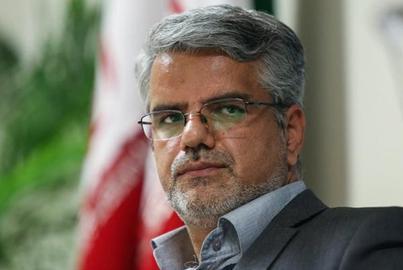The following article was written by an Iranian citizen journalist on the ground inside the country, who writes under a pseudonym to protect her identity.
With additional reporting by Reza HaghighatNejad
On Sunday, November 27, agents working for Iran’s judiciary visited the home of parliamentarian Mahmoud Sadeghi and tried to arrest him. The politician, who has been critical of the judiciary and spoken out in parliament about it, resisted the arrest.
A few hours earlier, it was reported that Tehran’s prosecutor had ordered the arrest, an account that Sadeghi confirmed. He told the Iranian Labor News Agency that his neighbors helped him to enter his home and thereby avoid arrest.
The head of the judiciary, Ayatollah Sadegh Larijani, had verbally attacked Sadeghi after the member of parliament had posed questions about some of Larijani’s financial dealings, which were said to be linked with government bank accounts.
So far there has been no official statement from either parliament speaker Ali Larijani or and other key leaders in parliament, although Deputy Speaker Ali Motahari announced he would be visiting Sadeghi’s home in Tehran.
The Omid faction, a group of pro-Rouhani MPs, has yet to release an official statement on recent events.
Soon after reports of the attempted arrest emerged, a group of journalists, political activists and reformist figures announced their intention to gather outside Sadeghi’s home to show their support for him.
Earlier in the week, Tehran’s prosecutor Abbas Jafari Dolatabadi had summoned Sadeghi in connection with a private complaint against him filed by Seyed Javad Sadatinejad, a member of parliament representing Kashan in Isfahan province. Sadatinejad has close links to the judiciary. Sadeghi said on Twitter that he was refusing to obey the summons because, as a member of the parliament he had immunity from arrest. It was up parliament’s disciplinary committee to decide on the issue, he wrote.
Over the last several weeks, the head of the judiciary, Ayatollah Sadegh Larijani, had attacked Sadeghi because he had raised questions about Larijani’s bank accounts. Sadeghi, however, insisted that he would not be intimidated and that it was his duty as a member of parliament to question and supervise the judiciary.
Rumors about Larijani’s financial dealings first emerged on October 23. DORR TV reported that Sadegh Larijani had 63 bank accounts amounting to a total of 1000 million tomans that received 22 billion tomans (close to $7 million) in interest monthly.
Soon after the reports, judiciary agents arrested three people from the judiciary and two employees of Bank Melli. Then, 10 days later, a news channel on Telegram reported that President Rouhani had discussed the matter with Supreme Leader Ayatollah Khamenei. The leader was said to be extremely angry.
On November 8, the Minister of Economy Ali Tayebnia confirmed the existence of the bank accounts, but said that the deposits had been made with the knowledge and cooperation of Iran’s Treasury.
The same Telegram channel reported that judiciary head Sadegh Larijani had summoned Tayebnia and admonished him for disclosing the existence of the accounts and discussing them during a cabinet meeting.
Tayebnia also said that although the principal of the deposits had never been touched, some of the interest had been used to pay some of the judiciary’s expenses.
A day after that report, Mahmoud Sadeghi tweeted: “Who does the interest on money paid by the people legally belong to?” Then, on November 14, during a public session of parliament, he demanded that Larijani submit a report detailing the bank accounts’ transactions over the last five years.
“A considerable part of the deposits are bail monies,” Sadeghi stated.
“What law allows government money to be deposited into personal accounts?” he asked. “What right does the judiciary have to deposit these funds and take possession of the interest?”
He then pointed out that, according to Article 53 of the constitution, of the Islamic Republic, all government proceeds must be deposited in accounts owned and controlled by the Iranian treasury.
Zohreh Zolghadr, Citizen Journalist
visit the accountability section
In this section of Iran Wire, you can contact the officials and launch your campaign for various problems


























comments